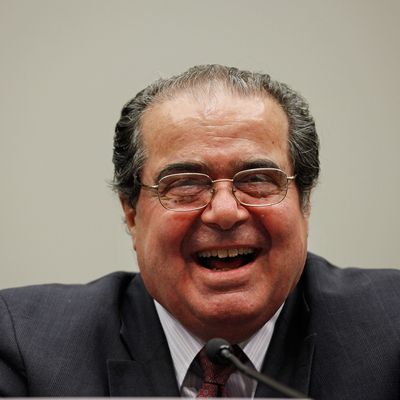
Five years ago, Jeffrey Rosen wrote a startling essay in the New York Times Magazine, describing a radical turn of events that is being borne out before our eyes. In the piece, Rosen described the rise of a new strand of conservative and libertarian judicial activists who believed the Constitution required small-government policies. Advocates of this theory believed judicial intervention was legally justified, of course, but also that it was necessary to win policy victories that conservatives could not obtain through Congress. “To Greve’s dismay,” wrote Rosen, citing one such scholar, “much of the regulatory state is politically quite popular; even a Republican Congress, he acknowledged, seems unlikely to roll back most post-New Deal programs and regulations. ‘Judicial activism will have to be deployed,’ he said. ‘It’s plain that the idea of judicial deference was a dead end for conservatives from the get-go.”
What made Rosen’s piece so shocking was that, for decades, judicial activism had been primarily associated with the left — liberal judges handed down broad readings of laws to expand rights, enraging conservatives who believed they were taking upon themselves decisions better left to democratic channels. Their complaints were not wholly unfounded — even if you support, say, abortion rights, as I do, the notion that the Constitution requires the right to an abortion is quite a stretch of judicial activism. The whole conservative legal and political movement had come to orient itself around opposition to judicial activism, which actually remains the term Republican politicians use to disparage liberal judges.
The only thing Rosen truly failed to anticipate in his piece was how quickly Republican judges would pivot from impassioned defenses of judicial restraint to judicial activism when the opportunity arose to deploy it in their party’s behalf. In the piece, he described Antonin Scalia as a fierce opponent of this movement. Scalia, wrote Rosen, “was not in favor of striking down laws in the name of ambiguous and contestable economic rights.” At one point Scalia attacked the movement to read economic rights into the Constitution as a “threat to constitutional democracy.”
The spectacle before the Supreme Court this week is Republican justices seizing the chance to overturn the decisions of democratically-elected bodies. At times the deliberations of the Republican justices are impossible to distinguish from the deliberations of Republican senators. They are litigating the problem of adverse selection, and doing it very poorly. (Here are health economists Henry Aaron and Kevin Outterson tearing their hair out over the justices’ bungled attempts to describe the economic dynamics at work.)
Scalia himself offers the most blatant case. His famed thunderings against meddlesome judges are nowhere to be found. He is gleefully reversing his previous interpretation of the Commerce Clause, now that it is being deployed against big government liberals rather than pot smokers. He is railing against Obamacare like an angry Fox News-watching grandfather:
In the morning session — in which the court weighed how much of the law should stand if the mandate is ruled unconstitutional — Scalia cited the horsetrading required to pass the bill — including the politically embarrassing, and failed, Cornhusker Kickback. He also admitted that he’d like to see the whole law fall if the mandate is ruled out of bounds.
In the afternoon, he took pains to remind the court of the unpopularity of the individual mandate.
The exchange occurred when Solicitor General Donald Verrilli Jr. rejected a hypothetical that relied on the notion of Congress passing a massive new tax. This, he argued, would have to overcome massive political constraints.
At that point Scalia chimed in: He would’ve thought the individual mandate would also be too much of a political liability to ever pass Congress.
In fact, the “Cornhusker Kickback” was stripped out before the final bill, but Scalia seems not to know that.
Just two years ago, the idea that conservatives might win the health-care fight in Court rather than the Senate seemed absurd. Just seven years ago, the notion that Republican jurisprudence would be defined by aggressive economic judicial activism seemed even more fantastical. But just as there are few atheists in foxholes, there aren’t a lot of justices of any persuasion willing to walk away from a chance to overturn a duly-passed law that they personally detest.






























